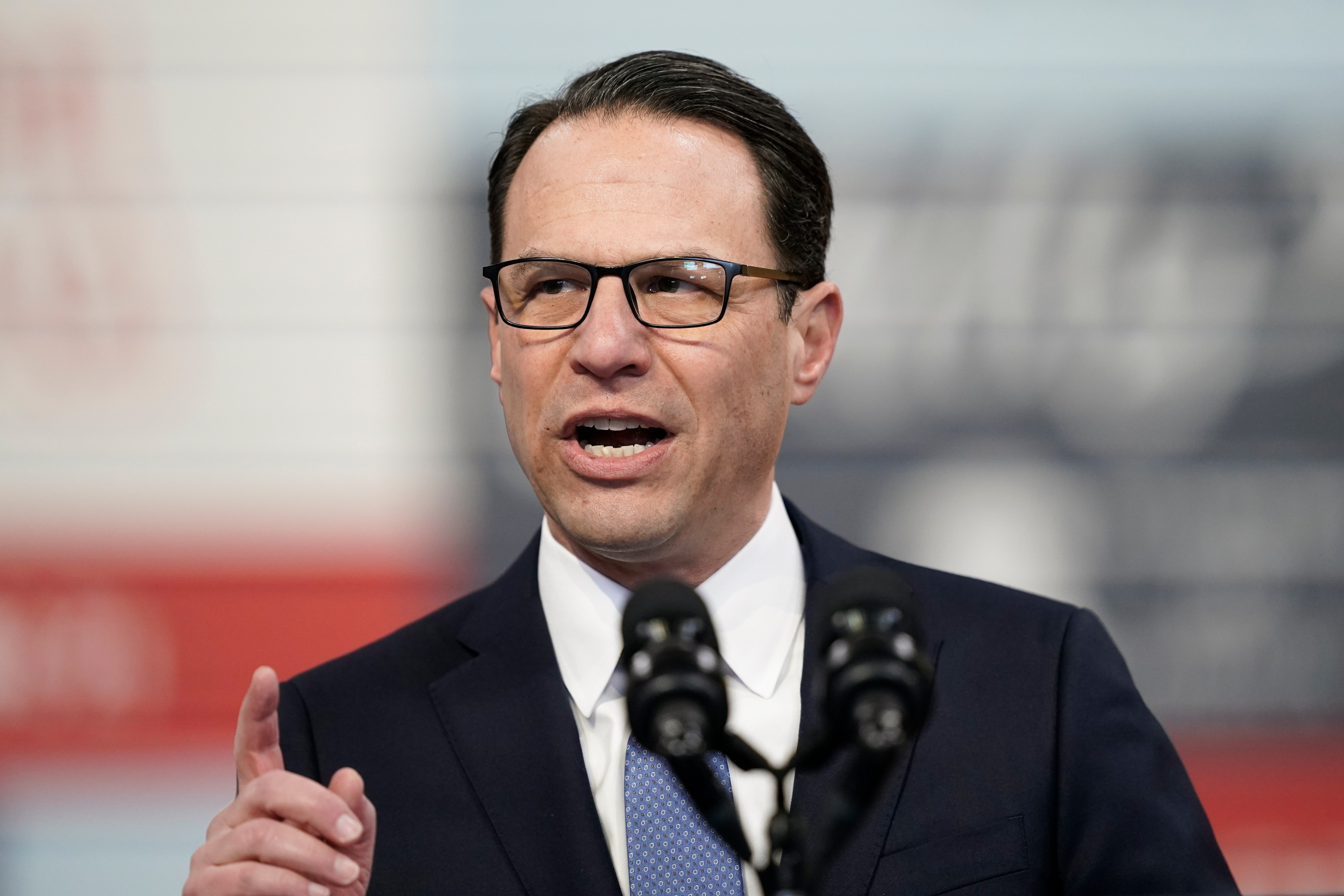World
Israel presses on with Gaza bombardments, including in areas where it told civilians to flee

RAFAH, Gaza Strip (AP) — Israeli warplanes struck parts of the Gaza Strip overnight into Saturday in relentless bombardments, including some of the dwindling slivers of land Palestinians had been told to evacuate to in the territory’s south.
The latest strikes came a day after the United States vetoed a United Nations resolution demanding an immediate humanitarian cease-fire in Gaza, despite it being backed by the vast majority of Security Council members and many other nations. The vote in the 15-member council was 13-1, with the United Kingdom abstaining.
“Attacks from air, land and sea are intense, continuous and widespread,” U.N. Secretary-General Antonio Guterres said before the vote. Gaza residents “are being told to move like human pinballs – ricocheting between ever-smaller slivers of the south, without any of the basics for survival.”
Guterres told the council that Gaza was at “a breaking point” with the humanitarian support system at risk of total collapse, and that he feared “the consequences could be devastating for the security of the entire region.”
Gaza’s borders with Israel and with Egypt are effectively sealed, leaving Palestinians with no option other than to try to seek refuge within the territory. The overall death toll in Gaza since the start of the war has surpassed 17,400, the majority of them women and children, according to the Health Ministry in Hamas-controlled Gaza, which does not differentiate between civilians and combatants in its count.
Israel holds Hamas responsible for civilian casualties, accusing the militants of using civilians as human shields, and says it’s made considerable efforts with its evacuation orders to get civilians out of harm’s way.
Palestinians mourn their relatives killed in the Israeli bombardment of the Gaza Strip, in front of the morgue at the hospital in Deir al Balah, Gaza Strip, on Friday, Dec. 8, 2023. (AP Photo/Adel Hana)
On Saturday, Gaza residents reported airstrikes and shelling in the northern part of the strip as well as in the south, including the city of Rafah, which lies near the Egyptian border and where the Israeli army had ordered civilians to evacuate to.
The main hospital in the central city of Deir al-Balah received the bodies of 71 people killed in bombings in the area over the past 24 hours, the Health Ministry said Saturday morning. The hospital also received 160 wounded, the ministry said. In the southern city of Khan Younis, the bodies of 62 people and another 99 wounded were taken to Nasser Hospital over the past 24 hours, the ministry said.
Israel has been trying to secure the military’s hold on northern Gaza, where furious fighting has underscored heavy resistance from the territory’s Hamas rulers. Tens of thousands of residents are believed to remain in the area despite evacuation orders, six weeks after troops and tanks rolled in during the war sparked by Hamas’ deadly Oct. 7 raid targeting civilians in Israel.
Israelis rush to a shelter as a siren sounds a warning of incoming rockets fired from the Gaza strip, in Tel Aviv, Israel, on Friday, Dec. 8, 2023. (AP Photo/Leo Correa)
About 1,200 people, mostly civilians, were killed in the Hamas raid, and more than 240 people taken hostage. A temporary truce saw hostages and Palestinian prisoners released, but more than 130 hostages are believed to remain in Gaza.
More than 2,200 Palestinians have been killed since the Dec. 1 collapse of the truce, about two-thirds women and children, according to Gaza’s Health Ministry.
Despite growing international pressure, the Biden administration remains opposed to an open-ended cease-fire, arguing it would enable Hamas to survive and pose a threat to Israel. Officials have expressed misgivings in recent days about the rising civilian death toll and dire humanitarian crisis, but have not pushed publicly for Israel to wind down the war, now in its third month.
“We have not given a firm deadline to Israel, not really our role,” deputy national security adviser Jon Finer told a security forum a day before the U.S. veto in the U.N. Security Council. “That said, we do have influence, even if we don’t have ultimate control over what happens on the ground in Gaza.”
Israeli Defense Minister Yoav Gallant argued a cease-fire would be a victory for Hamas. “A cease-fire is handing a prize to Hamas, dismissing the hostages held in Gaza, and signalling terror groups everywhere,” he said. “Stand with Israel in our mission – we are fighting for our future, and we are fighting for the free world.”
A delegation of foreign ministers from Arab nations and Turkey was in Washington to push the Biden administration to drop its objections to an immediate cease-fire. Jordanian Foreign Minister Ayman Safadi said Friday ahead of a meeting with Secretary of State Antony Blinken that Israel’s bombardment and siege of Gaza is a war crime, and one that is destabilizing the region.
As fighting resumed after a brief truce more than a week ago, the U.S. urged Israel to do more to protect civilians and allow more aid to besieged Gaza. The appeals came as Israel expanded its blistering air and ground campaign into southern Gaza, especially the southern city of Khan Younis, sending tens of thousands more fleeing.
“It was a night of heavy gunfire and shelling as every night,” Taha Abdel-Rahman, a Khan Younis resident, said by phone early Saturday.
Gaza’s Civil Defense Department said at least one person was killed late Friday in Rafah and others wounded in an airstrike on a family home.
The department posted images showing first responders and residents using flashlights and the light from cell phones to search the rubble of the house for potential survivors. One crane was seen removing the rubble while rescuers cut through iron poles amid collapsed concrete roofs.
Airstrikes were reported overnight in the Nuseirat refugee camp, where resident Omar Abu Moghazi said a strike hit a family home, causing casualties.
There were also airstrikes and shelling in Gaza City and other northern parts of the strip.
“It’s a routine,” Mohamed Abded, who lives in Gaza City’s Zaytoun neighborhood, said of the bombardment. “You have only one option: leave or they will kill you. That’s the case across the north.”
Israel has designated a narrow patch of barren coastline in the south, Muwasi, as a safe zone. But Palestinians who have headed there portrayed a grim picture of desperately overcrowded conditions with scant shelter and poor hygiene facilities.
“We didn’t see anything good here at all. We are living here in a tough cold. There are no bathrooms. We are sleeping on the sand,” said Soad Qarmoot, a Palestinian woman who was forced to leave her home in the northern town of Beit Lahiya.
“I am a cancer patient,” Qarmoot said late Friday as children circled a wood fire for warmth. “There is no mattress for me to sleep on. I am sleeping on the sand. It’s freezing.”
Imad al-Talateeny, a displaced man from Gaza City, said the area lacks basic services to accommodate the growing number of displaced families.
“I lack everything to feel a human,” he said, adding that he had a peaceful, comfortable life before the war in Gaza City.
“Here I’m not safe,” he said. “Here I live in a desert. There is no gas, no water. The water that we drink is polluted water.”
___
Magdy reported from Cairo and Becatoros from Athens, Greece.
___
Full AP coverage at https://apnews.com/hub/israel-hamas-war

World
G20 summit calls for more aid to Gaza and an end to the war in Ukraine
RIO DE JANEIRO (AP) — Leaders of the world’s 20 major economies called for a global pact to combat hunger, more aid for war-torn Gaza and an end to hostilities in the Mideast and Ukraine, issuing a joint declaration Monday that was heavy on generalities but short of details on how to accomplish those goals.
The joint statement was endorsed by group members but fell short of complete unanimity. It also called for a future global tax on billionaires and for reforms allowing the eventual expansion of the United Nation Security Council beyond its five current permanent members.
At the start of the three-day meeting which formally ends Wednesday, experts doubted Brazilian President Luiz Inácio Lula da Silva could convince the assembled leaders to hammer out any agreement at all in a gathering rife with uncertainty over the incoming administration of U.S. President-elect Donald Trump, and heightened global tensions over wars in the Mideast and Ukraine.
Argentina challenged some of the language in initial drafts and was the one country that did not endorse the complete document.
“Although generic, it is a positive surprise for Brazil,” said Thomas Traumann, an independent political consultant and former Brazilian minister. “There was a moment when there was a risk of no declaration at all. Despite the caveats, it is a good result for Lula.”
Condemnation of wars, calls for peace, but without casting blame
Taking place just over a year after the Oct. 7 Hamas attack on Israel, the declaration referred to the “catastrophic humanitarian situation in the Gaza and the escalation in Lebanon,” stressing the urgent need to expand humanitarian assistance and better protect civilians.
“Affirming the Palestinian right to self-determination, we reiterate our unwavering commitment to the vision of the two-State solution where Israel and a Palestinian State live side by side in peace,” it said.
It did not mention Israel’s suffering or of the 100 or so hostages still held by Hamas. Israel isn’t a G20 member. The war has so far killed more than 43,000 Palestinians in Gaza, according to local health officials, and more than 3,500 people in Lebanon following Israel’s offensive against Hezbollah, according to Lebanon’s Health Ministry.
The omitted acknowledgment of Israel’s distress appeared to run contrary to U.S. President Joe Biden’s consistent backing of Israel’s right to defend itself. It’s something Biden always notes in public, even when speaking about the deprivation of Palestinians. During a meeting with G20 leaders before the declaration was hammered home, Biden expressed his view that Hamas is solely to blame for the war and called on fellow leaders to “increase the pressure on Hamas” to accept a cease-fire deal.
Biden’s decision to ease restrictions on Ukraine’s use of longer-range U.S. missiles to allow that country to strike more deeply inside Russia also played into the meetings,
“The United States strongly supports Ukraine’s sovereignty and territorial integrity. Everyone around this table in my view should, as well,” Biden said during the summit.
Russian President Vladimir Putin did not attend the meeting , and instead sent his foreign minister, Sergey Lavrov. Putin has avoided such summits after the International Criminal Court issued a warrant that obliges member states to arrest him.
The G20 declaration highlighted the human suffering in Ukraine while calling for peace, without naming Russia.
“The declaration avoids pointing the finger at the culprits,” said Paulo Velasco, an international relations professor at the State University of Rio de Janeiro. “That is, it doesn’t make any critical mention of Israel or Russia, but it highlights the dramatic humanitarian situations in both cases.”
The entire declaration lacks specificity, Velasco added.
“It is very much in line with what Brazil hoped for … but if we really analyze it carefully, it is very much a declaration of intent. It is a declaration of good will on various issues, but we have very few concrete, tangible measures.”
Fraught push to tax global billionaires
The declaration did call for a possible tax on global billionaires, which Lula supports. Such a tax would affect about 3,000 people around the world, including about 100 in Latin América.
The clause was included despite opposition from Argentina. So was another promoting gender equality, said Brazilian and other officials who spoke on condition of anonymity because they weren’t authorized to speak publicly.
Argentina signed the G20 declaration, bit also had issues with references to the U.N.’s 2030 sustainable development agenda. Its right-wing president, Javier Milei, has referred to the agenda as “a supranational program of a socialist nature.” It also objected to calls for regulating hate speech on social media, which Milei says infringes on national sovereignty, and to the idea that governments should do more to fight hunger.
Milei has often adopted a Trump-like role as a spoiler in multilateral talks hosted by his outspoken critic, Lula.
Concrete steps for fighting global hunger
Much of the declaration focuses on eradicating hunger — a priority for Lula.
Brazil’s government stressed that Lula’s launch of the global alliance against hunger and poverty on Monday was as important as the final G20 declaration. As of Monday, 82 nations had signed onto the plan, Brazil’s government said. It is also backed by organizations including the Rockefeller Foundation and the Bill & Melinda Gates Foundation.
A demonstration Sunday on Rio’s Copacabana beach featured 733 empty plates spread across the sand to represent the 733 million people who went hungry in 2023, according to United Nations data.
Viviana Santiago, a director at the anti-poverty nonprofit Oxfam, praised Brazil for using its G20 presidency “to respond to people’s demands worldwide to tackle extreme inequality, hunger and climate breakdown, and particularly for rallying action on taxing the super-rich.”
“Brazil has lit a path toward a more just and resilient world, challenging others to meet them at this critical juncture,” she said in a statement.
Long-awaited reform of the United Nations
Leaders pledged to work for “transformative reform” of the U.N. Security Council so that it aligns “with the realities and demands of the 21st century, makes it more representative, inclusive, efficient, effective, democratic and accountable.”
Lula has been calling for reform of Security Council since his first two terms in power, from 2003 to 2010, without gaining much traction. Charged with maintaining international peace and security, its original 1945 structure has not changed. Five dominant powers at the end of World War II have veto power — the U.S., Russia, China, Britain and France — while 10 countries from different regions serve rotating two-year terms.
Virtually all countries agree that nearly eight decades after the United Nations was established, the Security Council should be expanded to reflect the 21st century world and include more voices. The central quandary and biggest disagreement remains how to do that. The G20 declaration doesn’t answer that question.
“We call for an enlarged Security Council composition that improves the representation of the underrepresented and unrepresented regions and groups, such as Africa, Asia-Pacific and Latin America and the Caribbean,” the declaration said.
The United States announced shortly before a U.N. summit in September that it supports two new permanent seats for African countries, without veto power, and a first-ever non-permanent seat for a small island developing nation. But the Group of Four – Brazil, Germany, India and Japan – support each other’s bids for permanent seats. And the larger Uniting for Consensus group of a dozen countries including Pakistan, Italy, Turkey and Mexico wants additional non-permanent seats with longer terms.
___
Associated Press writers Aamer Madhani in Rio de Janeiro, Edith M. Lederer at the United Nations and Isabel DeBre in La Paz, Bolivia contributed.
World
Foul play ruled out month after body of Walmart employee found inside walk-in oven at Canada store

A month after the body of a Walmart employee was found inside a walk-in oven of a store in eastern Canada, police have determined that her death was not suspicious.
The Halifax Police Department released a statement to announce that an investigation into the death of the 19-year-old woman, who was found inside the walk-in oven of the Halifax Walmart on Oct. 19, was not suspicious and there was no evidence of foul play.
“We do not believe anyone else was involved in the circumstances surrounding the woman’s death,” Halifax Regional Police Constable Martin Cromwell announced in a video update on the department’s Facebook page on Monday.
Cromwell added that they did not have many details they could share and did not expect any other updates anytime soon.
WALMART EMPLOYEE FOUND DEAD INSIDE WALK-IN OVEN AT CANADA STORE: POLICE
Authorities in Canada are continuing an investigation into the death of a 19-year-old employee at a Halifax Walmart bakery after police said there was no evidence of foul play. (Robyn Beck/AFP via Getty Images/File | GoFundMe)
“We acknowledge the public’s interest in this case and that there are questions that may never have answers,” said Cromwell. “Please be mindful of the damage public speculation can cause. This woman’s loved ones are grieving.”
Police have not yet released the name of the victim. However, the Gurudwara Maritime Sikh Society, an organization for Sikh immigrants, has identified the woman as Gursimran Kaur.
The group also created a GoFundMe page, which is no longer running, that raised more than $194,000 for Kaur’s family.
“Gursimran Kaur was only 19 years old, a young beautiful girl who came to Canada with big dreams,” a post on the website read.
IDENTITY OF ‘BADLY DECOMPOSED’ BODY FOUND IN OHIO CAR WASH RELEASED: REPORT

A woman was found dead inside a large walk-in oven at a Walmart store’s bakery department in Canada. (Robyn Beck/AFP via Getty Images/File)
According to the post, Kaur and her mother both worked at Walmart for the last two years.
During the evening of her daughter’s disappearance, the society executive said Kaur’s mother tried to find her after not having contact with her for an hour but brushed it aside, assuming she was helping a customer.
Kaur’s phone was reportedly also not reachable.
“Mother started panicking as it was unusual for her to switch her phone off during the day. She reached out to the onsite admin for help,” the post continued.
MISSOURI INFANT DIES AFTER MOTHER ‘ACCIDENTALLY’ PLACES BABY IN OVEN INSTEAD OF CRIB: POLICE

It’s unclear how the woman died, authorities said. (KTTV)
Sadly, after a few hours, her daughter’s body was found inside a walk-in oven in the store’s bakery.
“Imagine the horror that her mother experienced when she opened the oven, when someone pointed it out to her!” the society executive described. “This family’s sufferings are unimaginable and indescribable.”
Both Kaur’s father and brother were both reportedly in India at the time of her death.
“Investigators met with family to share this update and extend condolences,” Halifax police said. “Our thoughts remain with them at this difficult time.”
A spokesperson for Walmart previously told Fox News Digital that the store “will be closed until further notice.”
The Canadian Broadcasting Corp. reported that the store reopened on Monday and that the bakery oven was being removed from the store.
Fox News Digital reached out to Walmart for comment on the latest news but did not immediately receive a response.
Stepheny Price is writer for Fox News Digital and Fox Business. Story tips and ideas can be sent to stepheny.price@fox.com.
World
Hong Kong jails all 45 pro-democracy activists in largest security case

BREAKINGBREAKING,
Academic Benny Tai sentenced to 10 years, while others receive sentences of between four and seven years.
Taipei, Taiwan – A Hong Kong court has sentenced a leading pro-democracy advocate to 10 years in prison and handed dozens of other activists jail terms of between four and seven years in the Chinese territory’s largest national security case.
Benny Tai, a legal scholar who played a leading role in Hong Kong’s 2019 antigovernment protests, was handed the lengthy sentence on Tuesday after prosecutors cast him as the “organiser” of a conspiracy by pro-democracy activists and politicians dating back to July 2020.
Tai and 44 others were previously found guilty of offences related to organising an official primary election to choose pro-democracy candidates for the city’s legislature.
The would-be legislators had hoped to vote down the city’s budget and force the city’s leader to dissolve the legislature.
Prosecutors alleged that the group plotted to “overthrow” the government.
Many of those arrested have been on remand since 2021, when they were first charged, due to numerous legal delays and the disruption caused by COVID-19.
Out of 47 defendants, 31 pleaded guilty.
In May, a court found 14 of the remaining activists guilty of subversion and acquitted two others, former district councillors Laurence Lau and Lee Yue-shu.
Under Hong Kong’s national security laws introduced in 2020, defendants charged as “primary offenders” face a maximum punishment of life imprisonment, while lower-level offenders and “other participants” face sentences of between three and five years and up to three years, respectively.
-

 Business1 week ago
Business1 week agoRef needs glasses? Not anymore. Lasik company offers free procedures for referees
-

 News1 week ago
News1 week agoHerbert Smith Freehills to merge with US-based law firm Kramer Levin
-
/cdn.vox-cdn.com/uploads/chorus_asset/file/25724877/Super_Nintendo_World.png)
/cdn.vox-cdn.com/uploads/chorus_asset/file/25724877/Super_Nintendo_World.png) Technology1 week ago
Technology1 week agoThe next Nintendo Direct is all about Super Nintendo World’s Donkey Kong Country
-
Business6 days ago
Column: OpenAI just scored a huge victory in a copyright case … or did it?
-

 Health5 days ago
Health5 days agoBird flu leaves teen in critical condition after country's first reported case
-

 Business2 days ago
Business2 days agoColumn: Molly White's message for journalists going freelance — be ready for the pitfalls
-

 Technology1 week ago
Technology1 week agoHow a researcher hacked ChatGPT's memory to expose a major security flaw
-
Politics1 week ago
Editorial: Abortion was on ballots across the country in this election. The results are encouraging


















